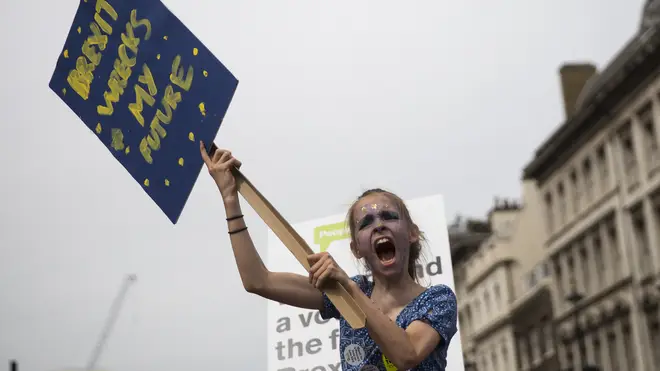
Henry Riley 7pm - 10pm
19 January 2019, 18:17 | Updated: 28 October 2019, 15:53
Number crunchers have calculated that with an ageing population, Britain has reached the point in which there are more Remain voters than Leavers.
Guardian columnist Polly Toynbee, who wrote about the findings, described that Crossover Day is the point in time that if everybody voted exactly the same way as they did in 2016, "Britain will have turned into a Remain nation".
"It explains why the opinion polls have been moving steadily in that direction," she said, adding that the calculations took into account voter turnout between the different ages, as well as the ratio of people voting between Leave and Remain.
She added: "You don't know that if we were to have another referendum that people might not change their mind either way, you can't guarantee that."
The date comes at the end of what's been a turbulent week in British politics, as Theresa May's Brexit deal suffered a heavy defeat in Parliament, before her government was challenged in a vote of no confidence.
- Brexit Timeline: Key Dates As The UK Prepares To Leave The EU
Former YouGov president Peter Kellner calculates, the 'Crossover Day' falls on Saturday 19th January 2019, just 10 weeks before 29th March.
Writing in the Independent, Psephologist and former YouGov president Peter Kellner explains that the date in which Britain 'turns remain' was worked out with demographic data.
"Demographic factors alone are causing the Leave majority to shrink by around 1,350 a day, or almost half a million a year," he says.
This, combined with the number of young people who are reaching the voting age, allows number crunchers to estimate the date in which there becomes more remain voters than those supporting leave.
Mr Kellner explains: "Around 600,000 Britons die each year. Polling research has shown consistently that elderly voters backed Brexit in the referendum by two-to-one. We also know that they turned out to vote in larger-than-average numbers."
With an estimated turnout of 80%, the number of voters who die is around 480,000; and with the leave/remain ratio taken into mind "we can estimate that 320,000 pro-Brexit voters and 160,000 pro-EU voters die each year".
The calculation for young voters was based on recent YouGov polling, that found 65% of people too young to vote in 2016 who would now be eligible to vote would be certain to do so.
"If I were to include all new voters who express an opinion, the decline in the Leave majority would be even faster," Mr Kellner explains.

The number of people reaching voting age is about 700,000 a year, and a 65% turnout means there are about 455,000 extra young voters each year.
"YouGov’s poll finds that as many as 87 per cent would vote Remain, and 13 per cent Leave."
Based on that, Mr Kellner estimates there to be 395,000 Remain voters join the electorate, as do 60,000 Leave voters.
To put this into net change, there would be an extra 235,000 Remain voters (395,000 new voters subtracting 160,000 who die) and 260,000 fewer Leave voters (60,000 new voters subtracting 320,000 who die).
The overall effect is to reduce the Leave majority by 495,000 a year, which is approximately 1,350 a day.
Finally, Mr Kellner applied this number to the majority of the 2016 referendum, which was 1,269,501. If the majority fell by 1,350 per day, the majority would disappear 940 days after the referendum, which happens to fall on 19th January 2019.
Some Brexiters have argued that the poll has 'celebrated' old British voters dying, calling it "sick and morbid".
A Labour MP described Polly Toynbee's article as "really unhelpful, ageist and divisive nonsense".
Writing on Twitter, Caroline Flint said: "Don't know whether Polly Tonybee realises but at the next General Election there will be more pensioners than ever and fewer young people. Many young working class first time voters voted Leave."
Really unhelpful, ageist and divisive nonsense. Don’t know whether @pollytoynbee realises but at the next General Election there will be more pensioners than ever and fewer young people. Many young working class first time voters voted Leave. https://t.co/iRS6wr9nLw
— Caroline Flint (@CarolineFlintMP) January 17, 2019
Others have pointed out that it was carried out on behalf of those campaigning for a second referendum.
But others have come out in support of the findings, with one Twitter user writing: "It's statistics, it's nothing to do with revelling in deaths".